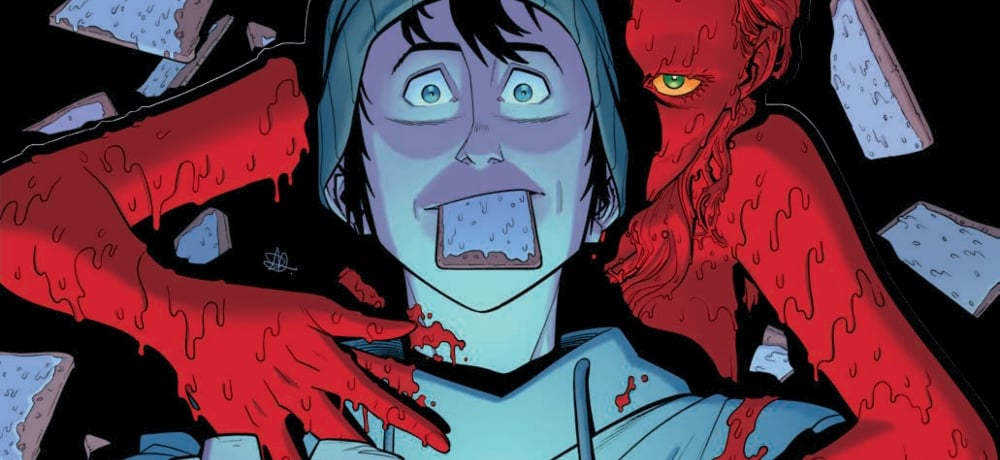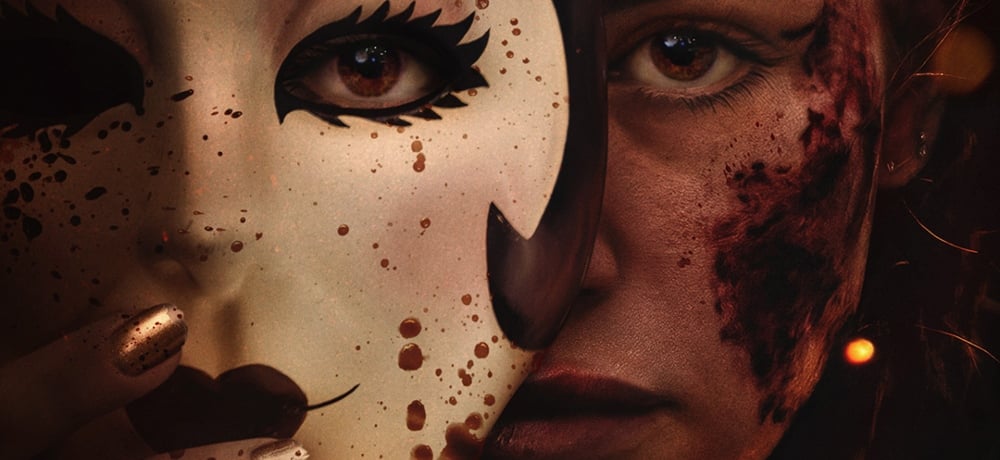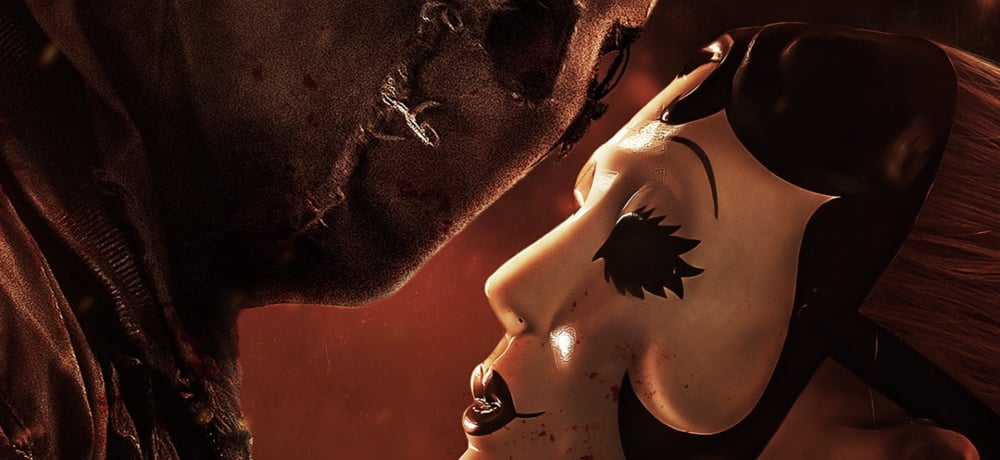





Michael McDowell is probably best known for his screenplays for Beetlejuice and The Nightmare Before Christmas, but his earlier horror novels are now being rediscovered as masterpieces of Southern Gothic fiction. Both The Elementals and McDowell's first novel, The Amulet, are now available as paperbacks and e-books from Valancourt Books and they've provided us with the prologue from The Elementals:
"After a bizarre and disturbing incident at the funeral of matriarch Marian Savage, the McCray and Savage families look forward to a restful and relaxing summer at Beldame, on Alabama’s Gulf Coast, where three Victorian houses loom over the shimmering beach. Two of the houses are habitable, while the third is slowly and mysteriously being buried beneath an enormous dune of blindingly white sand. But though long uninhabited, the third house is not empty. Inside, something deadly lies in wait. Something that has terrified Dauphin Savage and Luker McCray since they were boys and which still haunts their nightmares. Something horrific that may be responsible for several terrible and unexplained deaths years earlier — and is now ready to kill again . . .
A haunted house story unlike any other, Michael McDowell’s The Elementals (1981) was one of the finest novels to come out of the horror publishing explosion of the 1970s and ’80s. Though best known for his screenplays for Tim Burton’s Beetlejuice and The Nightmare Before Christmas, McDowell is now being rediscovered as one of the best modern horror writers and a master of Southern Gothic literature. This edition of McDowell’s masterpiece of terror features a new introduction by award-winning horror author Michael Rowe. McDowell’s first novel, the grisly and darkly comic The Amulet (1979), is also available from Valancourt Books."
To learn more, visit:
Prologue
"In the middle of a desolate Wednesday afternoon in the last sweltering days of May, a handful of mourners were gathered in the church dedicated to St. Jude Thaddeus in Mobile, Alabama. The air conditioning in the small sanctuary sometimes covered the noise of traffic at the intersection outside, but occasionally it did not, and the strident honking of an automobile horn would sound above the organ music like a mutilated stop. The space was dim, damply cool, and stank of refrigerated flowers. Two dozen enormous and very expensive arrangements had been set in converging lines behind the altar. A massive blanket of silver roses lay draped across the light-blue casket, and there were petals scattered over the white satin interior. In the coffin was the body of a woman no more than fifty-five. Her features were squarish and set; the lines that ran from the corners of her mouth to her jaw were deep-plowed. Marian Savage had not been overtaken happily.
In a pew to the left of the coffin sat Dauphin Savage, the corpse’s surviving son. He wore a dark blue suit that fit tightly over last season’s frame, and a black silk band was fastened to his arm rather in imitation of a tourniquet. On his right, in a black dress and a black veil, was his wife Leigh. Leigh lifted her chin to catch sight of her dead mother-in-law’s profile in the blue coffin. Dauphin and Leigh would inherit almost everything.
Big Barbara McCray—Leigh’s mother and the corpse’s best friend—sat in the pew directly behind and wept audibly. Her black silk dress whined against the polished oaken pew as she twisted in her grief. Beside her, rolling his eyes in exasperation at his mother’s carrying-on, was Luker McCray. Luker’s opinion of the dead woman was that he had never seen her to better advantage than in her coffin. Next to Luker was his daughter India, a girl of thirteen who had not known the dead woman in life. India interested herself in the church’s ornamental hangings, with an eye toward reproducing them in a needlepoint border.
On the other side of the central aisle sat the corpse’s only daughter, a nun. Sister Mary-Scot did not weep, but now and then the others heard the faint clack of her rosary beads against the wooden pew. Several pews behind the nun sat Odessa Red, a thin, grim black woman who had been three decades in the dead woman’s employ. Odessa wore a tiny blue velvet hat with a single feather dyed in India ink.
Before the funeral began, Big Barbara McCray had poked her daughter, and demanded of her why there was no printed order of service. Leigh shrugged. “Dauphin said do it that way. Less trouble for everybody so I didn’t say anything.”
“And nobody invited!” exclaimed Big Barbara.
“Dauphin is even making the pallbearers wait outside,” Leigh commented.
“But do you know why?” demanded her mother.
“No, ma’am,” replied Leigh, ignorant but uncurious. “Why don’t you ask Dauphin, Mama? He’s sitting right here, hearing every word that you speak to me.”
“I thought you might know, darling. I didn’t want to disturb Dauphin in his sorrow.”
“Barbara, shut up,” said her son Luker. “You know very well why it’s a private funeral.”
“Why?”
“Because we are the only people in Mobile who would have come. There’s no point in advertising a circus when everybody hates the clown.”
“Marian Savage was my best friend,” protested Big Barbara.
Luker McCray laughed shortly and punched his daughter in the ribs. She looked up and smiled at him.
Dauphin Savage, who had attended not very closely to this exchange, turned without rancor and said, “Y’all please be quiet, here’s the priest.”
They knelt to receive the priest’s summary blessing, then rose to sing the hymn “Abide With Me.” Between the second and third stanzas, Big Barbara McCray said loudly, “It was her favorite!” She turned to Odessa across the aisle and a curt bobbing of the dyed feather confirmed this opinion.
As the others sang the Amen, Big Barbara McCray said, “I miss her already!”
The priest read the service of the dead quickly, but with appealing expression. Dauphin Savage rose, moved to the end of the pew—as if he were unworthy a place nearer the coffin—and spoke briefly of his mother.
“Everybody who was lucky enough to know Mama real well loved her very much. I wish I could say she had been a happy woman, but that wouldn’t be the truth. She was never happy after Daddy died. She raised Mary-Scot and Darnley and me with all the love in the world, even though she always said she should have died on the day that Daddy was buried. And then Darnley died too. Everybody knows she had a hard time of it in the last few years—chemotherapy really does something bad to you, everybody knows that, and even then you’re not sure it’s working right. Of course we’re all sorry she’s dead, but we cain’t be sorry that she’s not in pain any more.”
He took a breath and glanced at Marian Savage in her coffin. He turned back, and in a sadder softer voice, went on: “The dress she has on is the one that she wore when I got married to Leigh. It was the prettiest dress she ever had, she said. When she took it off after the reception, she hung it up and said this was what she was saving it for. She would be real happy to see all the flowers here today, to see how much people cared for her. Ever since she died people have been calling up at the house and asking whether they ought to send flowers or make a donation to cancer research, and Leigh and me—whoever answered the phone—would say, ‘Oh, send flowers, Mama didn’t care anything about charity, but she always said that when she died, she hoped there would be a churchful of flowers. She wanted the smell to reach right up to heaven!’”
Big Barbara McCray nodded vigorously, and loudly whispered: “Just like Marian—just like her!”
Dauphin went on: “Before I went to the funeral home I was all upset thinking about Mama dead. But I went in there yesterday and I saw her and now I’m fine. She looks so happy! She looks so natural! I look at her and I think she’s gone sit up in that casket and fuss at me!” Dauphin turned toward the coffin and smiled tenderly at his dead mother.
Big Barbara grabbed her daughter by the shoulder. “Did you have a hand in the eulogy, Leigh?”
“Shut up, Barbara,” said Luker.
“Mary-Scot,” said Dauphin, looking toward the nun, “there anything you want to say about Mama?”
Sister Mary-Scot shook her head.
“Poor thing!” whispered Big Barbara. “I bet she’s just bowed down with grief.”
There was a troubled pause in the proceeding of the funeral. The priest glanced at Dauphin, who still stood at the end of the pew. Dauphin looked toward his sister, who only fumbled with her rosary. The organist peered over his railing above them, as if waiting for a cue to play.
“This is why you need a printed program,” whispered Big Barbara to her son, and looked at him accusingly. “When there’s not a printed program, nobody’s got the least idea in the world what to do next. I could have used a printed program for my scrapbook.”
Sister Mary-Scot stood suddenly in her pew.
“Is she gone speak after all?” asked Big Barbara in a hopeful voice that everyone heard.
Sister Mary-Scot did not speak, but her rising was evidently a signal. The organist, with a clumsy foot sounding discordantly on a couple of bass pedals, clambered down out of his loft, and disappeared through a small side door.
After nodding to Dauphin and to Sister Mary-Scot in somber conspiracy, the priest abruptly turned on his heel. His footsteps echoed the organist’s out of the sanctuary.
It was as if these two functionaries had suddenly determined, for a specific and overpowering reason, to abandon the ceremony before it was finished. And the funeral was certainly not over: there had been no second hymn, no benediction, no postlude. The pallbearers still waited outside the sanctuary. The mourners were left alone with the corpse.
In her vast astonishment at this unaccountable procedure, Big Barbara turned and said loudly to Odessa, who was a dozen yards distant, “Odessa, what do they think they are doing? Where did Father Nalty go? Why has that boy stopped playing the organ—when he gets paid special for funerals, I know he does!”
“Miz Barbara . . .” said Odessa with pleading politeness.
“Barbara,” said Luker in a low voice, “turn around and just shut up.”
She started to protest, but Dauphin said to her in a pained unhappy way, “Big Barbara, please . . .”
Big Barbara, who loved her son-in-law, sat still in her pew, though the effort cost her.
“Please, y’all, pray for Mama for a few minutes,” said Dauphin. Obediently the others bowed their heads.
From the corner of her eye, India McCray saw Sister Mary-Scot pull from beneath her scapular a long narrow black box. She held it tightly in her hands before her.
India flicked a long painted fingernail against the back of her father’s hand. “What has she got?” she whispered to him.
Luker looked over at the nun, shook his head in ignorance, and whispered back: “I don’t know.”
For many seconds then there was no movement in the sanctuary. The air conditioner started up suddenly, drowning the traffic outside. No one prayed. Dauphin and Mary-Scot, embarrassed and evidently most uncomfortable, stood staring at each other across the central aisle. Leigh had shifted a couple of feet down and turned sideways. With her elbow resting on the back of the pew, she held her veil raised so that she might exchange perplexed glances with her mother. Luker and his daughter grasped one another’s hands to communicate their wonder. Odessa stared fixedly ahead of her, as if she could not be expected to evince surprise at anything that was done at the funeral of a woman mean as Marian Savage.
Dauphin sighed loudly and nodded to his sister. Slowly they moved toward the altar, and took stations behind the coffin. They did not look down at their dead mother, but stared grimly ahead of them. Dauphin took the slender black box from the nun, unlatched it and lifted the top. All the McCrays craned but could see nothing of its contents. In the faces of the brother and sister was something at once so terrified and so solemn that even Big Barbara refrained from speech.
From the box, Sister Mary-Scot withdrew a shining knife with a narrow pointed blade about eight inches long. Together, Dauphin and Sister Mary-Scot held the dagger by its polished handle. Twice they passed it over the open space of the coffin, and then turned the point of it down over their mother’s unbeating heart.
Big Barbara’s astonishment was so great that she must stand; Leigh clutched her mother’s arm and rose as well. Luker and India followed suit, as did Odessa across the aisle. Standing, the mourners were able to see into the coffin. They half expected Marian Savage to sit up in protest at this extraordinary proceeding.
Sister Mary-Scot let go the handle of the knife. Her hands trembled in the space above the coffin, her lips moved in prayer. Her eyes opened wide as she reached down into the coffin and pulled apart the linen grave-clothes. Marian Savage’s unpainted flesh was distinctly yellow; Sister Mary-Scot pushed aside a prosthesis and uncovered the mastectomy scars. Drawing in his breath sharply, Dauphin raised the knife high.
“Lord, Dauphin!” cried Sister Mary-Scot, “get on with it!”
Dauphin pressed the blade an inch deep into the corpse’s sunken breast. He held it there the length of his shuddering.
He withdrew the knife slowly, as if fearful of causing Marian Savage pain. The blade emerged coated with the mixed coagulated liquids of the unembalmed body. Shuddering anew at the sensation of actually touching the corpse, he placed the knife in his mother’s cold stiff hands.
Sister Mary-Scot flung away the empty black box and it clattered on the polished wooden floor. Quickly she pulled together the graveclothes and without ceremony dropped the top of the coffin over the mutilated body of their mother. She rapped loudly three times on the lid. The sound was distressingly hollow.
The priest and the organist reappeared through the small side door. Dauphin and Mary-Scot dashed to the back of the church together and dragged open the great wooden doors to admit the pallbearers. The six men hurried down the aisle, lifted the coffin on their shoulders and, to the accompaniment of a thunderous postlude, carried it out into the fiery sunlight and blasting heat of that Wednesday afternoon in May.